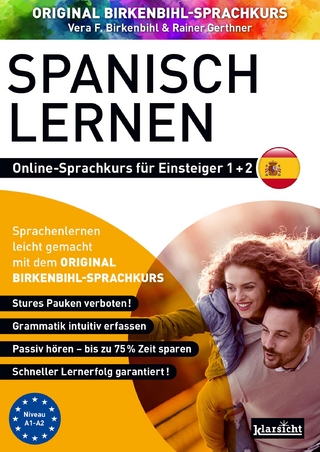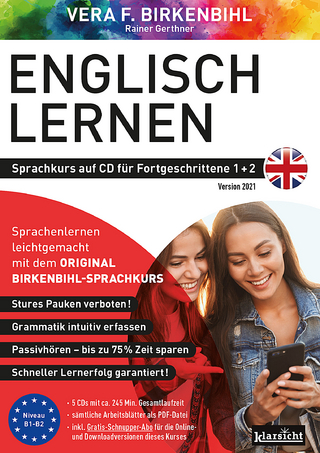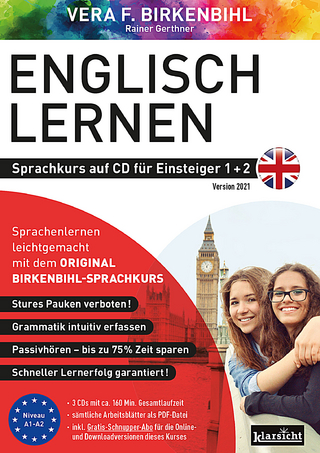
Michel Thomas Foundation Review Course
John Murray Learning (Verlag)
978-0-340-92937-7 (ISBN)
- Titel ist leider vergriffen;
keine Neuauflage - Artikel merken
Michel Thomas materials have been phenomenally successful since they were first published some six years ago. The brand new Review courses are a major new offering. For the first time, the student can quickly and easily review the entire teaching contents of the main course, to establish which areas need to be revisited or to consolidate learning. The Reviews can be used in many ways: when the student reaches the end of the main course to check or consolidate learning; as a quick refresher when the student returns to the main course after a lapse of time; for the newcomer to Michel Thomas looking for an overview of what the main courses contain. All the main teaching points have been lifted from the corresponding Foundation (8-hour) course and are contained on just 2 CDs. The student at home hears Michel teaching a specific point, there is a pause which allows time for the student to give his/her response to Michel's prompt, followed by Michel giving the correct response. If the student has struggled or given an incorrect answer, s/he can use the index in the accompanying booklet to locate the area of the main course where the specific language point was being taught in depth, and can return to the main course to work through the relevant section again, quickly and efficiently. Only Michel's words and phrases are on the new CDs, so the course is summarised succinctly and with a new, snappy pace.
Michel Thomas had an amazing life. Born in Poland, he spent his early years in Germany and then in France, where he studied psychology at the Sorbonne in Paris. When war broke out, he fought with the Resistance and suffered imprisonment in slave labour camps. At the end of the war he joined the US liberation army and later settled in the US where he established his world-famous language school. For more than 50 years he taught languages to the rich and famous and became the world's most sought-after language teacher.
Similarities with English: '-able', '-ible', '-ary', '-ent', '-ant', '-ance', '-ence', '-ion', '-ation', '-al' endings; 'it's possible, it's comfortable, it's for you, it's not for me'; 'it's like that, it's very different'; elision of last consonant of previous word to first of following; 'necessary'; 'I would like...': 'je voudrais parler francais avec vous' (I would like to speak French with you); 'Will you...': 'voulez-vous venir avec moi' (will you come with me = polite request); 'voulez-vous aller manger avec moi' (will you go eat with me); 'ou voulez-vous aller?' (where do you want to go?); 'ou voulez-vous aller manger ce soir?' (where do you want to go eat tonight?); 'je voudrais savoir ou c'est' (I would like to know where it is); 'je voudrais savoir combien c'est' (I would like to know how much it is); pronunciation of final consonants; 'c'est tres petit' (it's very small); 'c'est tres tard, c'est. trop tard' (it's very late, it's too late); 'il est grand, elle est grande' (he is big, she is big); 'c'est tres vite, c'est trop vite pour moi' (it's very fast, it's too fast for me); 'vous parlez trop vite pour moi' (You speak too fast for me); 'vous allez trop vite pour moi' (You go too fast for me'); 'c'est si bon, si c'est si bon' (it's so good, if it's so good); 'je voudrais savoir pourquoi c'est si bon' (I would like to know why it is so good); 'normalement' (normally: -ly > -ment); 'je voudrais un peu' (I would like a little); 'plus tard' (later); 'voulez-vous venir plus tard' (will you come later); 'autre', 'chose' (other, thing): 'je voudrais manger quelque chose' (I would like to eat something); 'je voudrais la meme chose pour moi, s'il vous plait' (I would like the same thing for me, please); 'je voudrais autre chose' (I would like something else); 'encore' (another/more/again): 'je voudrais encore un verre de vin blanc' (I would like another glass of white wine); nouns, adjectives, verbs; 'je dois parler avec vous' (I must speak with you); 'je suis tres fatigue maintenant' (I am very tired now); 'je suis tres occupe maintenant' (I am very busy now); 'je peux un peu' (I can a little: same sound); 'pas maintenant, pas pour moi merci' (not now, not for me thank you); 'je n(e) peux pas' (I cannot: this isn't a double negation); not all French people use ne signal; 'je n(e) suis pas fatigue maintenant' (I am not tired now); 'je regrette' (I am sorry); 'I am staying' same as 'I stay'; 'it is/it isn't'; 'I go/he goes/it goes'; 'I can/he can/it can'; verbs derived from similar nouns; 'I must/he must'; '-s' ending for 'I' (self); '-t' ending for 'he/she'; '-oir' verbs: 'avoir' (to have), 'savoir' (to know), 'devoir' (to have to), 'voir' (to see), 'pouvoir' (to be able to); 'aller' (to go); 'le faire' (to do it); 'le voir/la voir/les voir/vous voir/me voir' (to see it/him/her/you/me); 'lui' (to him); 'moi/vous/nous/lui/elle/leur' (me/you/us/him/her/them); 'mon, ma, mes/son, sa, ses/leur' (my/his/her/their); 'il y a' (there is); 'pas' (not); 'heureux de le faire' (happy to do it); 'quel/quelle' (which); 'que' (what), 'ce que' (what = that which); 'je dirai' (I will tell); three ways of forming future; 'on' (one/we); 'je me leve, nous nous levons, vous vous levez, il se leve, on se leve' (I get up, we get up, you get up, he gets up, one gets up); 'en': 'en France, en francais' (in France, in French); 'en passant, en attendant' (in passing, in waiting); 'en' to replace 'de ca' (of it, from it, some/any of it, some, any); 'il faut' (one must, it is necessary); 'je peux/veux/dois' + 2nd verb ('I can/want/must' + 2nd verb); 'je pouvais/voulais/devais + 2nd verb' ('I could/wanted/had to' + 2nd verb); 'j'aime' + 2nd verb ('I like/love' + 2nd verb).
| Erscheint lt. Verlag | 7.12.2006 |
|---|---|
| Reihe/Serie | Michel Thomas Series |
| Sprache | englisch |
| Maße | 136 x 192 mm |
| Gewicht | 180 g |
| Themenwelt | Schulbuch / Wörterbuch ► Wörterbuch / Fremdsprachen |
| Geisteswissenschaften ► Sprach- / Literaturwissenschaft ► Sprachwissenschaft | |
| ISBN-10 | 0-340-92937-5 / 0340929375 |
| ISBN-13 | 978-0-340-92937-7 / 9780340929377 |
| Zustand | Neuware |
| Haben Sie eine Frage zum Produkt? |
aus dem Bereich


